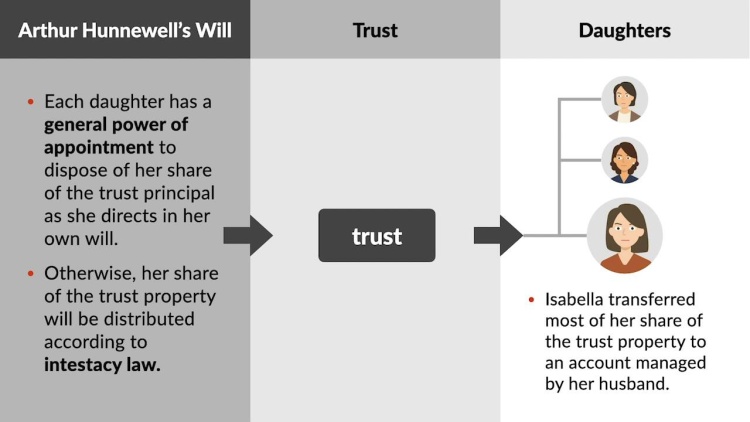Beals v. State Street Bank & Trust Co.
Massachusetts Supreme Judicial Court
367 Mass. 318, 326 N.E.2d 896 (1975)

- Written by Christine Raino, JD
Facts
Arthur Hunnewell died with a will that left the residue of his estate in trust for the benefit of his wife and four daughters. The trust income was paid to his wife during her lifetime, and upon her death the trust was divided into a separate portion for each of his then-living daughters. Each daughter received the income from her portion of the trust with the right to “direct and appoint by her last Will and Testament” whoever would receive the trust principal upon her death. If any of the daughters failed to make an appointment of the trust principal, the will directed distribution of the trust to whoever would take under the laws of intestacy. Per the request of Arthur’s daughter, Isabella H. Dexter, to make a discretionary transfer from the principal held in her portion of the trust to her husband’s account, the trustees (plaintiffs) agreed to transfer the majority of the principal. Isabella later filed with the probate court a partial release of her power of appointment under her father’s will to the extent she could appoint to anyone other than descendants of her father. Isabella died with a will, leaving the residue of her estate to the children of her deceased sister, Margaret Blake, without expressly exercising her power of appointment under her father’s will. Her sister, Jane, also survived Isabella but died soon after, leaving surviving children. The trustees filed a petition for instructions regarding how to distribute the principal of Isabella’s portion of the trust. If Isabella was found to have exercised her power of appointment in her will, Margaret Blake’s children would take all of the trust principal, but if she did not exercise that power, the principal would be divided, pursuant to the default provision, between Margaret and Jane’s children, Isabella’s surviving heirs. Jane’s estate argued that Massachusetts law should apply and that the power was a special power due to Isabella’s partial release, in which case a general residuary clause did not exercise a special power of appointment. Margaret’s children argued that New York law applied, and under this law a will that devised the entire estate exercised a special power of appointment, or alternatively, that the will expressed an intention to exercise the power, or, under Massachusetts law, that the power was a general power that was exercisable by a residuary clause. The probate court reserved judgment and certified the question to the court of appeals, and the Massachusetts Supreme Judicial Court transferred the case up for decision.
Rule of Law
Issue
Holding and Reasoning (Wilkins, J.)
What to do next…
Here's why 907,000 law students have relied on our case briefs:
- Written by law professors and practitioners, not other law students. 47,100 briefs, keyed to 996 casebooks. Top-notch customer support.
- The right amount of information, includes the facts, issues, rule of law, holding and reasoning, and any concurrences and dissents.
- Access in your classes, works on your mobile and tablet. Massive library of related video lessons and high quality multiple-choice questions.
- Easy to use, uniform format for every case brief. Written in plain English, not in legalese. Our briefs summarize and simplify; they don’t just repeat the court’s language.





